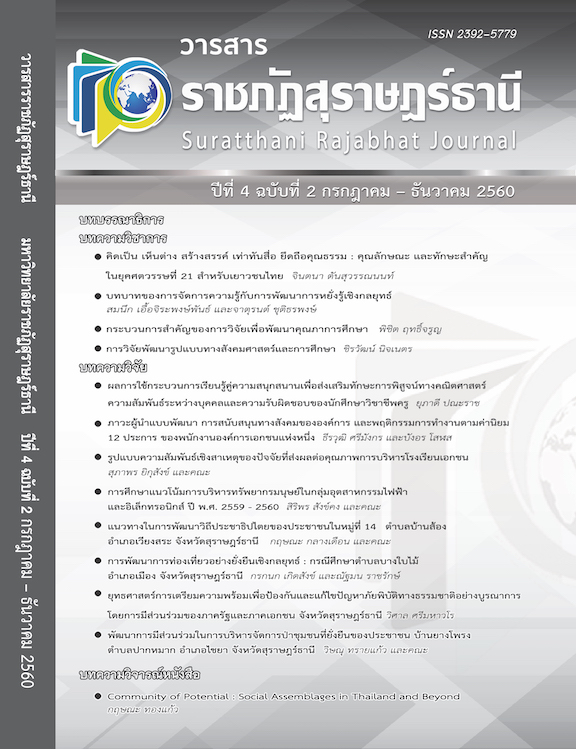แนวทางในการพัฒนาวิถีประชาธิปไตยของประชาชนในหมู่ที่ 14 ตำบลบ้านส้อง อำเภอเวียงสระ จังหวัดสุราษฎร์ธานี
Main Article Content
บทคัดย่อ
การศึกษาในครั้งนี้มีวัตถุประสงค์เพื่อศึกษาระดับความต้องการพัฒนาวิถีประชาธิปไตย และพัฒนาและประเมินวิถีประชาธิปไตยของประชาชน หมู่ที่ 14 ตำบลบ้านส้อง อำเภอเวียงสระ จังหวัดสุราษฎร์ธานี แบ่งขั้นตอนและวิธีการศึกษา 2 ขั้นตอนตามวัตถุประสงค์ ดังนี้
ขั้นตอนที่ 1 การศึกษาระดับความต้องการการพัฒนาวิถีประชาธิปไตย ศึกษาจากเอกสารและงานวิจัยที่เกี่ยวข้อง และเก็บข้อมูลโดยแบบสอบถาม ผลการศึกษาพบว่า ระดับความต้องการพัฒนาวิถีชีวิตประชาธิปไตยของประชาชนในชุมชน โดยภาพรวมอยู่ในระดับมาก เรียงลำดับจากมากไปหาน้อย ได้แก่ ด้านระบบการเมือง เป้าหมาย และวิถีชีวิตตามลำดับ
ขั้นตอนที่ 2 การพัฒนาวิถีประชาธิปไตยของประชาชน ผู้วิจัยจัดประชุมเชิงปฏิบัติการโดยเทคนิค AIC คัดเลือกผู้เข้าร่วมประชุมแบบเจาะจง จำนวน 30 คน ผลการวิเคราะห์สภาพปัญหาในปัจจุบันเกี่ยวกับการพัฒนาวิถีประชาธิปไตยของประชาชน (A1) ด้านเป้าหมาย พบว่า ประชาชนไม่มีโอกาสเข้าร่วมเสนอความคิดเห็นในเรื่องต่าง ๆ ส่วนใหญ่ไม่เห็นความสำคัญในการแสดงความคิดเห็น และอยู่ในวงแคบ ๆ ด้านระบบการเมืองพบว่ามีการซื้อสิทธิ์ ขายเสียง การไม่เข้าร่วมการประชุม และผู้นำหวังกอบโกยผลประโยชน์ และด้านวิถีชีวิต ได้แก่ การพูดจาด้วยถ้อยคำไม่สุภาพ นิทานกล่าวร้ายเสียดสี ไม่ยอมรับฟังความคิดเห็นของผู้อื่น และไม่มีส่วนร่วมในการวางแผนดำเนินงาน การกำหนดแนวทางการพัฒนาในอนาคต (A2) ด้านเป้าหมาย ได้แก่ การประชาสัมพันธ์งาน กิจกรรมต่างๆ ของหมู่บ้าน ร่วมกันเสนอความคิดเห็น ผู้นำควรรับฟังข้อเสนอแนะต่าง ๆ ควรมีการให้ความรู้เกี่ยวกับ สิทธิหน้าที่ การปฏิบัติตนเป็นพลเมืองดีตามวิถีประชาธิปไตย ด้านระบบการเมือง ได้แก่ การซื้อสิทธิ์ขายเสียง การใส่ร้ายฝ่ายตรงข้าม ผู้นำควรมีวิสัยทัศน์กว้างไกล ประชาชนมีสิทธิ์เสนอผู้รับเลือกตั้ง และการให้ความรู้เกี่ยวกับการเลือกตั้ง และด้านวิถีชีวิต ได้แก่ การพูดจากันด้วยถ้อยคำที่สุภาพ ไม่นินทาว่าร้ายผู้อื่น ร่วมรับฟัง และเสนอความคิดเห็น ในการพัฒนาชุมชนในโอกาสต่างๆ
การสร้างแนวทางการพัฒนา (Influence : I) ในด้านเป้าหมาย พบว่า ประชาชนมีแนวคิดให้ตั้งกล่องรับความคิดเห็นเพื่อผู้นำชุมชนได้ทราบถึงความต้องการหรือการพัฒนา วิถีประชาธิปไตยของประชาชนที่แท้จริง หรือเปิดลานกาแฟตอนเช้าให้ได้พูดคุยแลกเปลี่ยนความคิดเห็น ด้านระบบการเมือง มีความต้องการปรับปรุงคุณสมบัติของตัวผู้แทน การเข้าสู่ตำแหน่งที่โปร่งใส สนับสนุน ส่งเสริมการมีส่วนร่วม ต่อต้านการซื้อสิทธิ์ขายเสียง ให้ความรู้เกี่ยวกับการเลือกตั้ง ด้านวิถีชีวิต พบว่า ต้องการเข้าไปมีส่วนร่วมในการพัฒนาวิถีชีวิตประชาธิปไตย สำหรับการระดมความคิดแยกประเภทโครงการ จัดลำดับความสำคัญของกิจกรรม คำนึงถึงคนส่วนใหญ่ได้รับประโยชน์ และสามารถแก้ปัญหาได้หลายอย่าง ทั้งกิจกรรมที่ประชาชนจัดทำด้วยตนเอง เสนอต่อองค์การบริหารส่วนตำบล และเสนอหน่วยงานอื่นๆ
การสร้างแนวทางในการปฏิบัติ (Control : C) การแสวงหาผู้รับผิดชอบ (C1)ให้สมาชิกแต่ละคนมาลงชื่อในกิจกรรมโดยสมัครใจ กิจกรรมที่สามารถทำเองได้ คือ กิจกรรมตั้งกล่องรับความคิดเห็นเพื่อเสนอต่อผู้นำชุมชน กิจกรรมที่ต้องขอความช่วยเหลือจากองค์การบริหารส่วนตำบล คือ การประชุมประชาคมเสริมสร้างประชาธิปไตยในชุมชนเพื่อการพัฒนา ที่ยั่งยืน ส่วนกิจกรรมที่ต้องการความร่วมมือจากหน่วยงานอื่น คือ การอบรมให้ความรู้ในเรื่องการเมือง การวางแผนแต่ละกิจกรรม (C2) เป็นการกำหนดรายละเอียดและขั้นตอนที่ชัดเจนของการจัดกิจกรรมแต่ละประเภททั้งที่สมาชิกสามารถทำเองได้ ที่เสนอองค์การบริหารส่วนตำบล และที่จะขอการสนับสนุนจากหน่วยงานอื่น ผลการประเมินวิถีประชาธิปไตยของประชาชน โดยเปรียบเทียบความรู้เกี่ยวกับวิถีประชาธิปไตยของกลุ่มตัวอย่าง ระหว่างก่อนการอบรมและหลังการอบรม พบว่า คะแนนเฉลี่ยด้านความรู้หลังการอบรมสูงกว่าคะแนนเฉลี่ยด้านความรู้ก่อนการอบรมอย่างมีนัยสำคัญทางสถิติที่ระดับ 0.05
Article Details
เอกสารอ้างอิง
ทินพันธุ์ นาคะตะ. (2543). ประชาธิปไตยไทย (พิมพครั้งที่ 2). กรุงเทพฯ : สหายบล็อกและการพิมพ.
นวพรรณ ริ่นเกลื่อน. (2549). การพัฒนาวิถีชีวิตประชาธิปไตยของนักเรียนระดับมัธยมศึกษาตอนต้นในเรียนท่าเฟืองวิทยา อำเภอกาญจนดิษฐ์จังหวัดสุราษฎร์ธานี. วิทยานิพนธ์ศิลปศาสตรมหาบัณฑิต สาขาสังคมศาสตร์เพื่อการพัฒนา มหาวิทยาลัยราชภัฏสุราษฎร์ธานี.
สัญญา สัญญาวิวัฒน์. (2554). ทฤษฎีและกลยุทธ์การพัฒนาสังคม. กรุงเทพฯ : จุฬาลงกรณ์มหาวิทยาลัย.
Krejcie, R. V. & Morgan, D. W. (1970). Determining Sample Size for Research Activities. Educational and Psychological Measurement, 30(3) : 607 - 610.


